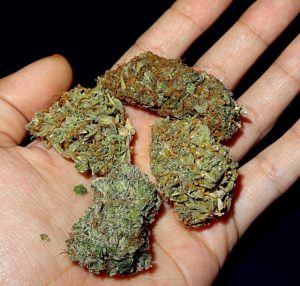Fresno Law Enforcement Doesn’t Kid Around With Marijuana
Despite legalization of recreational marijuana sales earlier this year, Fresno remains one of the communities wherein  cannabis-related activity is still banned: No recreational sales, no medical sales, no commercial growing, no testing, no distribution, no manufacturing. Residents can grow indoors for personal use or if they are a caretaker, but that’s it.
cannabis-related activity is still banned: No recreational sales, no medical sales, no commercial growing, no testing, no distribution, no manufacturing. Residents can grow indoors for personal use or if they are a caretaker, but that’s it.
Still, officials know of more than 70 unlicensed sales operations in the city. Law enforcement agencies are stretched thin, however, so they have to prioritize their time and resources.
They recently focused their efforts on one specific dispensary, according to High Times, which was reported to be selling high-potency cannabis candy wrapped in packaging that was appealing to children. Agents seized 150 pounds of the candy and more than $200,000 after a two-month investigation of the dispensary. Six dispensary operators were given misdemeanor marijuana citations.
When it comes to sales of marijuana, which is still considered an illegal Schedule I narcotic under the federal Controlled Substances Act, 21 U.S.C. Section 812, it wouldn’t seem like packaging would be the top priority for law enforcement. However, keeping cannabis out of the hands of children has been a prevalent and important theme for everyone in the legalization process. No one on either side of the issue wants to see cannabis in the hands of children. Relevant restrictions have included keeping cannabis retailers a certain distance from parks, schools, and places where children regularly frequent, as well as making sure tax money is allocated for education and prevention programs geared at students. Further, regulations dictate that “packages and labels shall not be made to be attractive to children,” according to Medicinal and Adult-Use Cannabis Regulation and Safety Act Sec. 74. Continue reading
 Cannabis Law Group's Medical Marijuana Legal Blog
Cannabis Law Group's Medical Marijuana Legal Blog





 After Proposition 64 passed, much of the regulation of both medical marijuana and recreational marijuana sales feel into the hands of several state agencies, including a newly created marijuana agency. However, the cities and local municipalities still get to decide on various issues related to the recreational cannabis industry. This includes regulations that pertain to licensing stores within their respective jurisdictions, whether they should apply a local tax to the sale of marijuana for recreational use, and various other issues.
After Proposition 64 passed, much of the regulation of both medical marijuana and recreational marijuana sales feel into the hands of several state agencies, including a newly created marijuana agency. However, the cities and local municipalities still get to decide on various issues related to the recreational cannabis industry. This includes regulations that pertain to licensing stores within their respective jurisdictions, whether they should apply a local tax to the sale of marijuana for recreational use, and various other issues. 